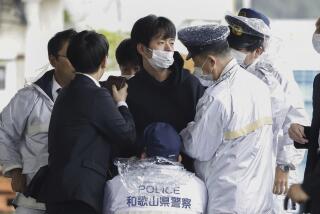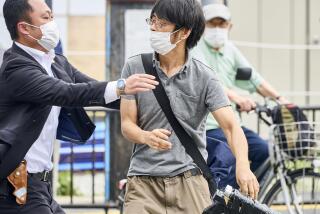Suspected Terrorist Arrested in N.J. : FBI Launches Intense Probe After Trooper Stops Japanese Man
- Share via
NEW YORK — A 35-year-old Japanese citizen who was seized on the New Jersey Turnpike while transporting three sophisticated anti-personnel bombs was held without bail Friday as a massive FBI investigation sought to determine whether he is a member of the Japanese Red Army terrorist organization.
Law enforcement officials were mindful of the U.S. bombing of Libya on April 15, 1986, and a leading theory being pursued was that Yu Kikumura may have been preparing for major acts of retaliation within the United States to mark the anniversary.
The Red Army is suspected of detonating the car bomb outside the USO club in Naples on Thursday that killed a U.S. Navy enlisted woman and four Italians and wounded 16 other people, four of them Americans.
Kikumura, who was traveling with a stolen Japanese passport, was identified through fingerprints. International computer checks showed that he had previously been arrested in Amsterdam, the Netherlands, at Schiphol Airport in May, 1986. At that time he was carrying six fuses and two pounds of TNT. He was later acquitted, on technical grounds, of charges filed by Dutch authorities.
Security was extremely tight when Kikumura appeared in handcuffs and ankle chains before U.S. Magistrate Ronald J. Hedges in federal court in Newark, N.J. Hedges ordered him held without bail for a hearing on April 25 on charges of unlawful possession of firearms and carrying a fraudulent visa.
A state police spokesman said trooper Robert Cieplenski noticed Kikumura loitering at the Vince Lombardi rest station in Ridgefield, N.J. about 7 a.m. Tuesday. When the trooper approached Kikumura, the suspect dashed to his 1980 Mazda and drove off.
Cieplenski caught up with Kikumura and arrested him, officials said. He showed an international driving permit, issued in Tokyo on Jan. 20, 1988. He also presented a New York State temporary identity card with a Manhattan address.
As the trooper was examining these documents, he noticed a flight bag on the rear seat of the car. According to an FBI affidavit, the bag was open and contained six cardboard canisters with the words “black powder” written on them. On the floor of the car, the trooper found an open box containing three steel canisters loaded with gunpowder and attached with wires. He placed Kikumura, who was carrying $3,600 in cash and a Swiss bank account card, under arrest.
After a bomb squad was summoned, police searched the car more thoroughly. They found coils of electrical wire, packages of flash bulbs, nine-volt batteries, empty containers with labels, wire cutters, a circuit tester, a hacksaw and other tools. They also found a document from an electronics store in West Virginia, where some of the equipment had been purchased.
The FBI later determined that Kikumura had appeared at the U.S. Embassy in Paris, and, using a stolen Japanese passport in the name of Masatoshi Kishizono, had received a visa to enter the United States. He arrived at New York City’s Kennedy International Airport from Paris on March 8 and soon went to an agency specializing in finding apartments and roommates.
In the second week of March, Kikumura was sent by the agency to meet Chris Brande, a 25-year-old accountant, who was seeking a roommate for the four rooms he occupied on Manhattan’s East Side near the Queens-Midtown tunnel.
In an interview with The Times in his apartment, Brande said Kikumura had paid him rent and a deposit totaling $1,400 with new $100 bills. He said that Kikumura said he was a tourist and inquired if his room had a lock on the door and if he would have privacy.
“He looked around and said he would like to be my roommate for a month. He was aloof, quiet, polite,” Brande said. “ . . . He basically stayed to himself.”
Brande said that Kikumura made phone calls the first day or two after he moved in, telling people he had arrived. He had no suitcases, but carried a small gym bag and several plastic shopping bags.
“He said he wanted to be a tourist,” the accountant said. “He asked for maps. When he first came, he said he would be here a month. He said he was here for tourism and it would be cheaper than a hotel. . . . He never talked politics.”
Staff writer Ronald J. Ostrow in Washington contributed to this story.
More to Read
Sign up for Essential California
The most important California stories and recommendations in your inbox every morning.
You may occasionally receive promotional content from the Los Angeles Times.










